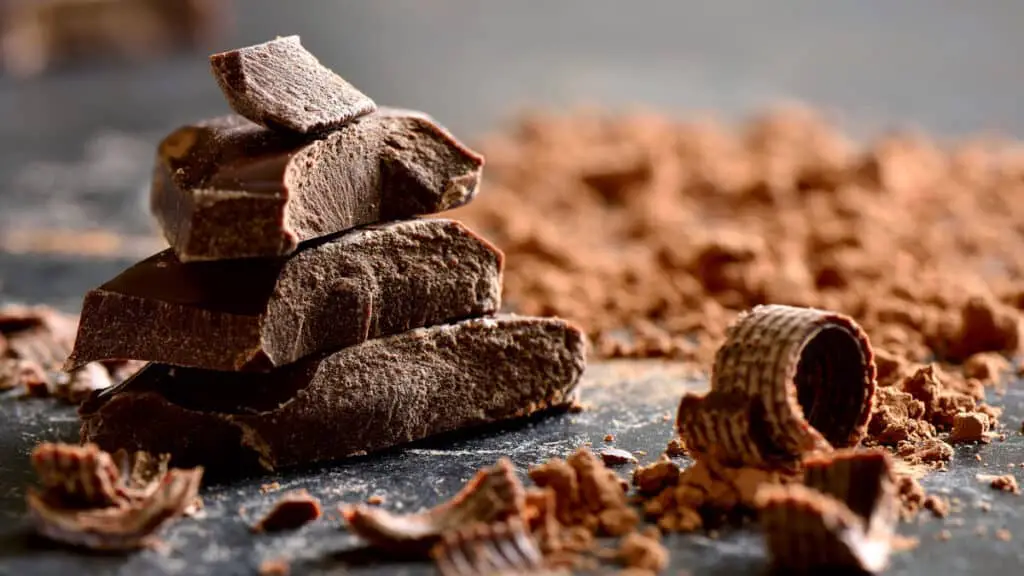Skip To Section
Feeding chocolate to your horse is a bad idea. Chocolate contains theobromine, a chemical that is toxic to a number of domestic animals including horses and dogs. When horses ingest large amounts of theobromine, it can cause serious health problems. Chocolate also contains high levels of sugar and fat, with low levels of fiber, vitamins, and minerals, contributing little benefit to a horse’s diet.
If you’re asking yourself whether horses can eat chocolate, stop right there! Chocolate is a human treat, provides no nutritional benefit for horses, and can actually be harmful to horses and other domestic animals. It could even make them ineligible to participate in sporting events…
Read this post to better understand why chocolate is unsuitable as a horse treat, the risks it can pose to horse health, and what you should do if your horse consumes it.
Can Horses Eat Chocolate?

To fully understand the answer to this question you first need to consider a horse’s body, how the horse normally eats, and how different it is from a human being.
Horses have evolved as herbivorous grazing animals with an anatomy and physiology which reflects their dietary needs. Their stomachs are small and their rate of digestion rapid, with food moving through their intestines at a rate of up to 1 foot per minute.
To keep pace with their speedy digestion and stay in full health, horses may need to graze for up to 17 hours each day on a variety of pasture grasses, hay, and non-toxic meadow plants. Following a pattern close to their natural diet in the wild can minimize the risk of common horse complaints including stomach ulcers, colic, laminitis, and other health issues.
This regular grass-based diet and plenty of water, are generally all that a healthy average horse will require. Supplements, energy-dense cereals (e.g. oats), and fruit or vegetables (e.g. apples) may be given in moderation in some circumstances in tandem with their core grass diet.
While horses are capable of digesting an array of foods including cereals, fruits, and vegetables this doesn’t mean that their core diet should ever be anything other than grass-based plants. Fruits and vegetables can be best viewed as occasional treats, which can reinforce training and build a strong bond with their owners. Apples, pears, and carrots are common favorites, due to their sweetness.
While horses often do love the taste of even sweeter foods like chocolate, and a small amount is unlikely to cause harm in a healthy horse, this doesn’t mean that these items are good for your horse or that they should become a regular treat.
Horses can eat a small amount of chocolate, in the sense that a tiny amount won’t have a massive effect, but you still shouldn’t feed it to them. To begin with, chocolate contains the chemical theobromine which is harmful to horses. Then, it also lacks any useful fiber, vitamins, and minerals that horses could get from more natural foods.
At the same time, chocolate includes significant amounts of sugar and fat, neither of which have a place in a healthy equine diet, and both of which could contribute to colic and other digestive problems.
If horse owners want to give sweet treats to their animals, fruit, and vegetables are recommended rather than processed confectionary. Apples, pears, and carrots are all popular choices of horse treats.
If your horse has an insulin resistance disorder, you should definitely never feed it chocolate or any other sugary treat. Seek expert advice on appropriate treat foods which will help maintain normal blood sugar levels and avoid health problems.
There is no good reason to feed your horse chocolate.
Risks
Chocolate is made from the roasted seeds of the plant Theobroma cacao. Chocolate products generally contain both caffeine and theobromine, structurally similar stimulants belonging to the methyl-xanthine alkaloid group.
Unlike humans, the digestive systems of horses and several other domestic animals (e.g. dogs) are unable to metabolize theobromine (or caffeine) effectively. This means that if they consume this chemical it can remain in their bloodstream for long periods and build up more easily to a damaging level.
Ingesting theobromine in horses creates health risks including accelerated heart rate and heart attack, colic or diarrhea, internal bleeding, metabolic issues, and epileptic seizures. However, a very large quantity of chocolate would have to be consumed to produce these levels of toxicity or to kill a horse.
While you might see references online to cases of horses dying through poisoning from theobromine in chocolate, they appear to come from horses living or working around cocoa bean plantations or production facilities with unusual access to high levels of theobromine-rich materials.
The exact amount of theobromine or caffeine present in ordinary chocolate depends on natural variation in cocoa bean crops, different types of chocolate (e.g. white, milk, and dark), and the production methods of different chocolate brands.
As an illustration, the amount of theobromine in white chocolate is negligible, while dark chocolate contains around 5.5 mg per kilogram, cocoa bean hulls contain around 9.1 mg per kilogram, and dry cocoa powder contains around 28.5mg per kilogram.
The risk of chocolate poisoning in a horse is also relative to its size, with risks higher in smaller horses compared to larger horses, if eating the same amount of chocolate.
Caffeine is present in chocolate at levels 3-10 times lower than theobromine, producing similar effects. Both can contribute to poisoning in horses and other animals. Some online vet calculators let you explore how much theobromine and caffeine particular chocolate products contain and how great a threat these may pose to horses of different sizes.
Consult your vet if you are concerned about something harmful your horse may have eaten. If your horse has eaten something unusual, but not necessarily harmful, pay close attention to any signs of pain or distress. Continue to offer water and a normal diet of grass or hay to keep the digestive system working normally.
If you are interested in potentially racing your horse in competition then do remember that theobromine and caffeine are both banned substances for the purposes of horse racing. Feeding chocolate to your horse creates the risk that they might fail a drug test and become ineligible to race or lose their placing.
What To Do If Your Horse Eats Chocolate?
If your horse has eaten a small amount of normal chocolate, it is unlikely to have ingested enough theobromine to do serious harm. Watch your horse for any signs of digestive discomfort and ensure they have access to plenty of grass, hay, or haylage and clean water.
However, if your horse has eaten a significant amount of chocolate, especially something in which theobromine is highly concentrated, it could need urgent veterinary assistance.
As an example, if a 500kg horse ate 1kg of different cocoa products, its intake of theobromine could vary as follows:
- White chocolate – 0.02 mg of theobromine.
- Milk chocolate – 4.09 mg of theobromine.
- Dark chocolate – 9.18 mg of theobromine.
- Cocoa beans – 42.36 mg of theobromine. (Seek emergency medical help.)
- Cocoa powder – 52.03 mg of theobromine. (Seek emergency medical help.)
If your horse has eaten large amounts of chocolate, especially if this included whole cocoa beans, cocoa powder, or some other concentrated chocolate form, seek expert medical advice very quickly.
FAQs
Is Chocolate Toxic For Horses?
Chocolate contains theobromine which is toxic to horses and other domestic animals and can harm or even kill a horse in high enough concentrations.
However, given the large size of horses and the small amount of theobromine in an average chocolate bar, it is unlikely in most circumstances that a horse will ever eat enough chocolate to cause serious poisoning.
Is Chocolate Bad For Horses?
Yes, chocolate is bad for horses.
As well as containing the harmful chemicals theobromine and caffeine which the horse digestive system cannot adequately metabolize, chocolate contains high levels of sugar and fat, and low levels of fiber, vitamins, and minerals.
This nutritional profile is very far from a horse’s natural diet and provides no benefits whatsoever. While some fruits are also high in sugar, they can at least also give vitamins, minerals, pectin, and fibre.
Can A Horse Eat White Chocolate?
A healthy horse could probably eat a small amount of white chocolate without ill effect but it would be better to give them a carrot or chopped apple.
While white chocolate contains only tiny amounts of theobromine, it is still high in sugar and fat, without significant levels of vitamins and minerals. This poor nutritional profile makes it a bad choice of treat for any horse.
Can A Horse Eat Milk Chocolate?
Milk chocolate is also bad for horses, containing theobromine (around 4.1 g per kg), caffeine, sugar, and fat while lacking fiber and any useful horse nutrients.
As with other dairy products, milk contains lactose, which horses cannot digest. If a horse eats milk products, it may experience digestive disruption, discomfort, and diarrhea.
Healthy horses will probably not experience ill effects from eating a small amount of milk chocolate but we do not recommend it.
Can A Horse Eat Dark Chocolate?
Dark chocolate contains even higher levels of theobromine than milk chocolate (around 9.1 g per kg). Again, it is high in sugar and fat and low in fiber or any useful horse nutrients.
Healthy horses will probably not experience ill-effect from eating a small amount of dark chocolate but we do not recommend it.
Can Horses Eat Chocolate Chip Cookies?
It would be better to eat the cookie yourself!
A healthy horse is unlikely to suffer ill-effect from a single cookie but a piece of fruit or vegetable would be a better treat.
As well as the poor nutritional profile of chocolate, the cookie may contain dairy products and eggs, none of which are foods that the horse’s digestive tract has evolved to deal with.
Can Horses Eat Chocolate Cake?
Again, it would be better to eat the cake yourself!
If a healthy horse eats a piece of chocolate cake, it is unlikely to do serious harm but a treat of an apple or carrot would be better for your horse’s health and digestive system.
As with cookies, as well as considering the poor nutritional profile of chocolate, remember that the cake could contain dairy products or eggs. These are not foods that the horse’s digestive tract has evolved to deal with.
Conclusion
Do not feed chocolate to horses in any form. Chocolate isn’t good for horses and can potentially be very harmful in quantity. Instead, choose healthy fruit and vegetable treats such as apples, carrots, pears, or bananas and give these in moderation as a complement to their regular grass-based diet.
To learn more important information about what you should and shouldn’t feed to horses, head over to Amazing Horse Facts, a site full of useful and fascinating facts for horse lovers of any age.
